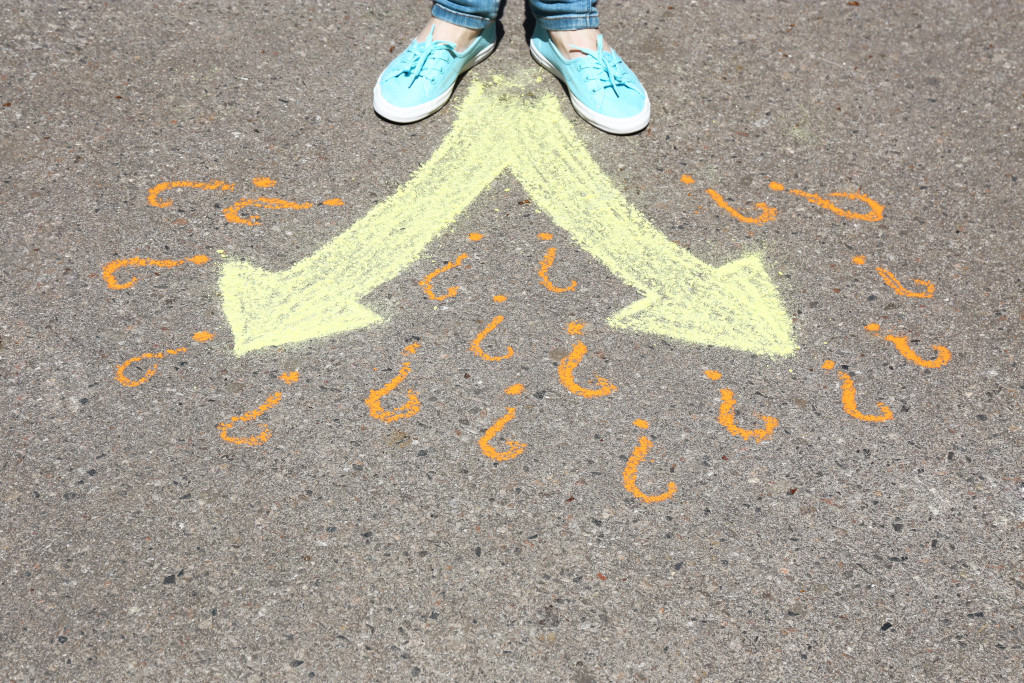The Five Stages of Grief
According to the Kubler-Ross Model, there are five stages of grief. This model was first applied to grief from terminal illness, but it translates to all forms of intense grief. There are five stages of grief: denial, anger, bargaining, depression, and acceptance. People do not travel through these feelings together, so individuals often experience a different stage than a loved one is struggling through.
Take for example, my struggles with infertility and miscarriage. When I became pregnant the first time, my husband and I were elated. I knew the likelihood of miscarriage, but my husband was unaware of how common it was. We had tried to get pregnant for a year, and he felt that miscarriage was something that happened to others.
My Story Begins

As my small belly began to grow, we went to the doctor for my 12-week checkup, only to discover that, although the baby was gone, my body simply refused to let it go. Even pregnancy tests still showed positive, and I still suffered all the early pregnancy symptoms.
The next day, we went to the hospital for a D&C to remove the baby. It was devastating, and to top it off, we were told that we should wait three months for my body to recover before we started trying again. Thankfully, a few months later, we were pregnant again with a healthy baby boy.
So now that we had already had one successful pregnancy, the second should be a breeze, right? After the first, we never tried not to have a baby. But I nursed my son for a year, so we didn’t expect to become pregnant right away. We became a bit more urgent in our attempts during my son’s second year of life. I watched many friends and relatives become pregnant easily, and I couldn’t understand why it wasn’t happening for us.
After a second year with no success, a friend urged me to seek help. I began infertility treatments, tests, drugs, appointments, timed intercourse . . . you name it, we did it. It felt like a full-time job and definitely took the fun out of trying. Very early in my treatment, I became pregnant. However, this pregnancy soon ended in miscarriage.
Persistence and Perseverance
But I wasn’t defeated. We had pretty quickly had success, and now we just needed to keep going until a pregnancy stuck. But about a year went by during which I spent a lot of time, money, and pain on continuing my fight, with no success. Every month, there was my period again, and I had to start over.
I finally became pregnant again, and we were so happy. I was pregnant for nine weeks, but around the seventh week, the HCG tests that I took every three days started to decline, a sure-fire sign that miscarriage would happen soon. So I waited for the inevitable end to yet another pregnancy.
This time, it was hard. I had been trying for so long. I felt like giving up, but I had already been through so much, I couldn’t stop now. I knew in my heart that our family was meant for another baby.
My husband was over it. He saw the toll it was taking on me. He had already been through three miscarriages with me now, and, to him, it became something he just expected. He couldn’t understand why I couldn’t just be happy with the family that we had already created. He didn’t understand why this miscarriage was so hard on me.
And to top it all off, I was now 39 years old. The risk of complications increases when you turn 40. So, I felt a major urge to get this goal accomplished now, for once and for all.
A New Plan of Action
My doctor, however, was from the old school of thought that we should do as little intervention as possible. After all, I had one successful pregnancy under my belt, and I had three miscarriages, so we knew I could get pregnant.
But now I was even more determined, and demanded we try IVF so that I could hopefully have a baby before I turned 40.
The IVF process was full of stress, at a time when I was trying to be as calm as possible for my potential baby. The drugs were confusing and painful to take. The appointments and downtime were even more consuming than my regular treatments. The stakes were even higher as our expenses increased.
We ended up with two embryos. After all I had already been through, I convinced my husband that we should implant both because it would be hard and expensive for me to go through this process again. We did, and I got pregnant! As my HCG skyrocketed off the charts, a sure sign of multiples, we were convinced we were having twins. When I attended my many doctor appointments, the staff referred to my babies in the plural because they were convinced, as well.
When we finally had the first ultrasound, we were pleasantly relieved to find just one perfect baby nestled in my belly. The first trimester was nerve-wracking as we hoped with all our hearts that another miscarriage wouldn’t ensue. Thankfully, it did not, and I gave birth to a beautiful little girl, exactly one month before I turned 40.
Oh, and my fertility doctor immediately retired. I was his last miracle!
So, this story ends well. But the grief that my husband and I each experienced throughout the long process to create our family was profound and different for both of us.
Separate Experiences Together

He was most upset by the very first miscarriage.
I was dismayed, but I also knew that a first miscarriage was not a precursor to future disappointment. I even asked if I was still pregnant at the beginning of the appointment at which we learned the bad news. Who asks that? I think I subconsciously knew.
But my husband experienced denial, anger, bargaining, depression, and acceptance during this miscarriage. Not to say that I didn’t, but it was more intense for him.
For me, as bad as the first miscarriage was, the third one was the most devastating. I had already been through so much. I had so much hope wrapped up in the success of that pregnancy, only to be defeated yet again. And I didn’t have the support I really needed from my husband, who was just used to it by now. I was finally facing feelings of failure and the possibility that perhaps a second baby wasn’t in the cards for us.
I remember wailing alone in my closet upstairs for hours so that my son wouldn’t know that anything was wrong.
But once some time passed, that’s when I developed my plan that eventually was successful. I was doing IVF, and I wasn’t taking “no” for an answer.
I experienced the five stages of grief during the process, especially after my third miscarriage. As I learned that my HCG was dropping and I’d surely miscarry, I was in denial, constantly googling times when women had a different result. Once I began to miscarry, I was angry. My husband wasn’t there for me like I felt he should be. My friends and relatives were all having no problem getting pregnant. I felt very alone. Then I began the bargaining stage. I told everyone I could about our struggle. If I could help one family, it was worth it. And I needed their prayers and support.
Throughout the process, I experienced depression on-and-off as I rode the roller coaster of infertility.
And finally, after recovering from my third miscarriage, I accepted that what I was doing wasn’t working, and I developed a plan that was eventually successful and enabled me to move on.
You’re Not Alone
If you are experiencing grief, understanding the stages can help you or your loved ones get through it. In the denial stage, there is avoidance, confusion, elation, shock, and fear. In the anger stage, there is frustration, irritation, and anxiety. In the bargaining stage, we struggle to find meaning, reaching out to others, and telling our story. During the depression stage, we feel overwhelmed, helpless, hostile, and as though we would do anything to remove ourselves from the situation. Finally, in the acceptance stage, we explore our options, develop a new plan, and move on. Two people usually don’t experience these stages at the same time, and it is normal to go back and forth between the stages until you reach acceptance.
If you and/or a loved one is grieving, understanding the feelings associated with that time can make it all a bit easier for you both.













